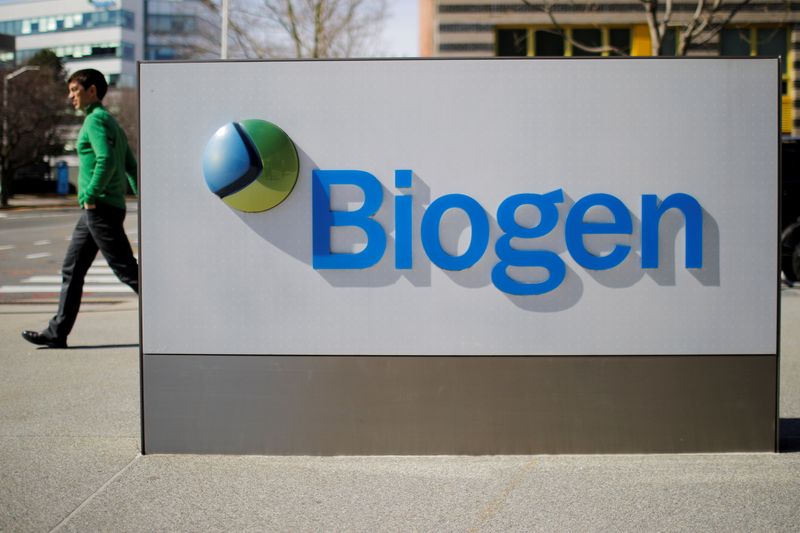© Reuters. FILE PHOTO: The Alzheimer’s drug LEQEMBI is seen in this undated handout image obtained by Reuters on January 20, 2023. Eisai/Handout via REUTERS/File Photo
By Leroy Leo and Julie Steenhuysen
(Reuters) -A panel of expert advisers on Friday unanimously agreed that a late-stage trial of Eisai and Biogen (NASDAQ:)’s Alzheimer’s drug Leqembi verified the benefit of the treatment for those at an early stage of the disease, clearing the way for traditional U.S. approval.
All six advisers on the panel voted in favor of Leqembi for treatment of the mind-wasting illness.
Regular approval by Food and Drug Administration – a decision expected by July 6 – is likely to expand Medicare payment for the treatment.
That approval would also make Leqembi the first disease-modifying drug ever to achieve the regulatory milestone. Current treatments only treat symptoms but do not change the course of the disease, which affects 6 million Americans, according to the Alzheimer’s Association.
Leqembi won accelerated approval by the FDA in January based on its ability to remove sticky amyloid plaques from the brain. The panel on Friday considered Eisai’s large confirmatory trial designed to show the drug benefited patients.
That study, published in November, showed the drug slowed cognitive decline by 27% in early Alzheimer’s patients, but was also associated with some serious side effects for some patients, including brain swelling and bleeding or microhemorrhages.
“I believe the benefit versus risk are beneficial, acceptable and in line with this class of therapeutics, especially considering the burden of the disease and the progressive nature of the disease,” said panel member Dr. Tanya Simuni, professor of neurology at Northwestern (NASDAQ:) University Feinberg School of Medicine.
“Overall, it demonstrated clearly that this is an effective treatment in the population as it was defined,” said Dr. Robert Alexander, committee chair and an Alzheimer’s expert at the Banner (NASDAQ:) Alzheimer’s Institute. He added that he thought the study “clearly demonstrated a clinical benefit,” calling the results “robust.”
SIDE EFFECTS
FDA also asked the panel to weigh in on Leqembi’s side effects in certain patient populations.
Those included patients taking drugs that prevent blood clots, those who have a gene variant called APOE4 that increases the risk of Alzheimer’s, and those with a rare condition called cerebral amyloid angiopathy (CAA), in which the protein amyloid that the drug targets builds up in the walls of arteries in the brain and can cause bleeding.
Members of the panel generally said the risks for those with two copies of the APOE4 gene were balanced by the drug’s benefits, although they urged the FDA to strengthen language in the drug’s prescribing label recommending genetic testing for the risk gene.
Some on the panel raised concerns about giving Leqembi to patients taking anticoagulants. Others said patients should be given the option as long as they are made aware of the risks.
The panel also said it would not recommend excluding patients with CAA, which can be hard to diagnose, from taking the drug. It suggested limiting Leqembi’s use in patients with the most severe cases of the condition, called cerebral amyloid angiopathy-related inflammation, because of the heightened risk of brain bleeding.
Under accelerated approval, Medicare restricted payment of the drug to those in a clinical trial, but no such trials are underway for Leqembi, resulting in negligible sales. Most U.S. Alzheimer’s patients are Medicare-eligible.
The federal agency that runs Medicare has said it will pay for the treatment if doctors participate in a health agency database, known as a registry, but has yet to release details of its plan.
Wall Street analysts widely expect the FDA to grant traditional approval for the drug. Analysts have forecast Leqembi sales topping $1 billion in 2026 and reaching $5.7 billion by 2030.
Alzheimer’s Association CEO Joanne Pike in a statement urged approval and expanded patient access “without barriers.”
“We are in full agreement with the FDA Advisory Committee that Leqembi provides clinical benefit and that this benefit outweighs the risks.” she said.
Read the full article here










